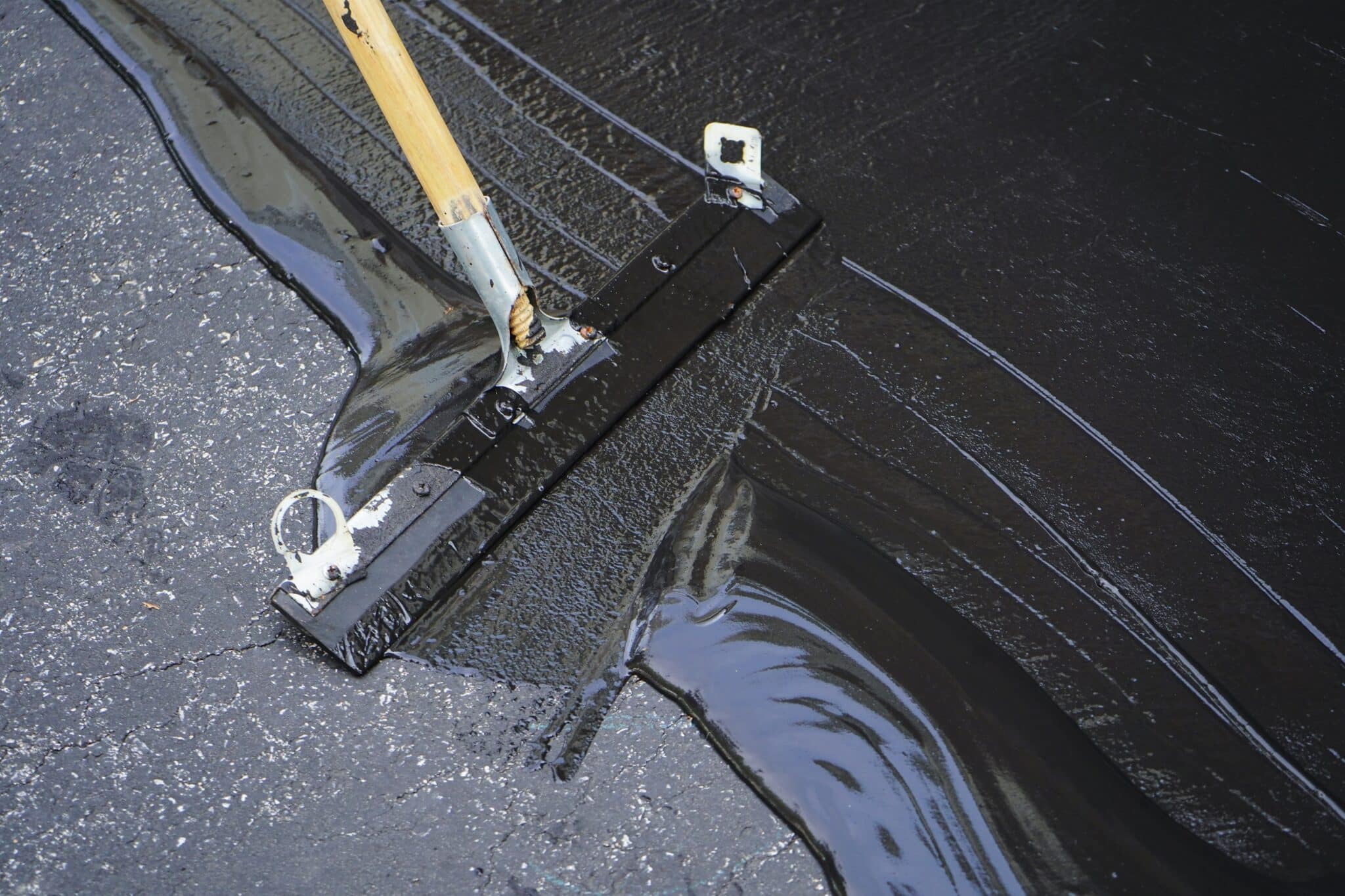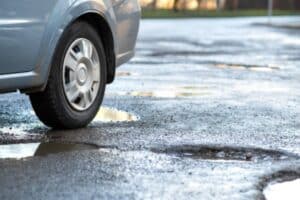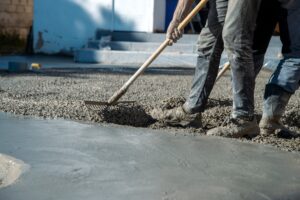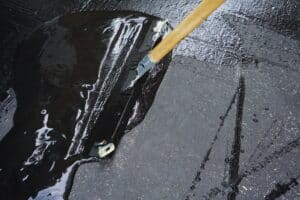Your driveway or parking lot is important for the overall appearance of your property. In fact, it’s one of the first things people see. Sealcoating your parking lot or driveway is an easy way to extend the life of asphalt and improve the curb appeal of your property. Asphalt sealcoating is an easy and relatively inexpensive process that can keep your driveway in excellent condition. But what is sealcoating and how does it work?
In this article, we will explain what sealcoating is, how it works, how to seal coat, and the benefits of this asphalt maintenance task.
What is Sealcoating?
Sealcoating is an asphalt maintenance treatment wherein a thin liquid layer added over a paved surface to protect it from damage caused by UV rays, rain and snow, and fluids from vehicles. Sealcoating won’t cure existing issues, like cracks, but it will help prevent such damage from forming in the first place and smooth surfaces a bit. With the surface seal coat intact, the underlying asphalt is protected from the effects of water, wind, and sunlight that can degrade and harden the asphalt and cause it to crack and crumble.
How Sealcoating Works
Despite asphalt’s superior waterproofing and adhesive capabilities, it still has some downsides in its chemical makeup. These downsides make it easy for water, salt, and other chemicals to degrade asphalt’s molecular structure. As the asphalt molecules break down, the pavement loses its binding and waterproofing properties. You can see this phenomenon in action when asphalt pavement turns from black to grey.
Sealcoating is usually made up of varying amounts of dissolved asphalt, mineral fillers, and water. It is applied as a spray or with a squeegee or broom. The sealant is specifically engineered using oils and materials that are commonly used in asphalt paving. When applied to the asphalt pavement surface, the oils in the seal coat seep down and help replenish some of the depleted asphalt oils and binder that have dried up over time.
At the same time, the tiny asphalt, sand, and mineral particles fill in small cracks and gaps between the pieces of aggregate, making the pavement surface more even and level. The asphalt pavement will look almost like new pavement with the oils replenished and the cracks and gaps filled in. The seal coat also protects the asphalt pavement and harmful elements like UV rays from the sun, water, chemicals, and abrasion from traffic.
How to Seal Coat Asphalt
Each sealing company will have its own way of handling sealcoating, but typically, a basic sealcoating process involves the following steps:
- The entire pavement is cleaned of accumulated dirt, dust, debris, and stone. A good sealcoat job requires a clean surface.
- The sealing crew performs minor repairs, like filling potholes and cracks.
- The crew then applies the seal coat material, usually using squeegees, making sure to apply it from multiple directions to ensure proper coverage.
- Once sealcoating is applied, it needs to remain untouched for 24 hours to allow the liquid in the seal coat to evaporate, leaving the solids. Be gentle after that. Sharp turns can mark your surface. Do not turn the wheel while the car is stationary.
Seal coating is usually performed from spring through fall. This is because the process requires temperatures of at least 55 degrees Fahrenheit for the duration of the application and no more than a 40% chance of rain for eight hours following the application. Outside of those conditions, you risk the seal coating not curing properly.
Why Sealcoat Asphalt?
There are several benefits of sealcoating asphalt in your driveway or parking lot. Think of sealcoating as preventative maintenance for your driveway or parking lot. In that way, it’s similar to painting your home or business to protect it from the elements.
1. Weatherproof
One of the most significant factors that deteriorate asphalt driveways is water damage. When water seeps into cracks and pavement, it erodes the ground beneath your driveway. Sealcoating your driveway protects it from rain, snow, and water overflow. It also accelerates the melting process of snow and ice on pavement surfaces. This helps protect against water penetration, rain, frost, and snow damage.
2. Improved appearance
With exposure to the elements, asphalt pavement over time becomes faded in appearance. New sealcoating can preserve the resilience of asphalt surfaces. It helps hide small cracks, patches, and rough spots, as well as making traffic lines on parking lots more visible. A quality sealcoat can turn a haggard, worn-looking driveway into a smooth, clean-looking, beautiful surface that will raise the perceived value of your property. Sealcoating naturally looks spotless and well-maintained.
3. UV and chemical protection
Just like how UV rays can age your skin, they can also age and damage your driveway. The sun’s rays cause oxidation, which results in driveway deterioration. Sealcoating acts as a sunblock by preventing harmful UV rays from aging asphalt. Sealcoating asphalt also protects your pavements, driveways, and parking lots from gas, oil, and other substances that can eat away at an asphalt surface.
4. Cost-effective
The low cost of regular sealcoating can save you money in the long run. When asphalt driveways become extensively damaged, repairs can be difficult and pricey. So, maintaining asphalt driveways through sealcoating is the best and most cost-effective way to avoid having to make large driveway repairs. A properly maintained and sealed asphalt surface has an extended lifetime and reduces long-term repair costs. Also, sealcoating is much more affordable than replacing asphalt. If damage to your driveway isn’t extensive, then sealcoating could save you thousands of dollars.
5. Easy maintenance
A sealed driveway or parking lot is easier to clean than untreated asphalt surfaces. Driveway and parking lots that are exposed to leaves and other debris can be effectively managed and maintained after a sealant is applied. They can be quickly swept with a broom. You can also wash them without fear of water seeping into cracks and deteriorating your driveway.
How Often Should You Seal Coat?
Seal coating should be performed between 6 months to 1 year after new asphalt is installed to allow proper cure and wear of the surface. After this, it’s recommended that you have your driveways and parking lots seal coated every two to three years for normal use or every year if the pavement experiences heavy traffic.
The seal coat may show signs of wear after a few years, but this doesn’t necessarily indicate that the asphalt isn’t still being protected. You can usually go a while longer before re-application or can seal coat the asphalt again for aesthetic purposes. We’ll be sure to let you know if it doesn’t need to be seal coated quite yet!
Protect your home or business from costly damages and repairs with a cost-effective sealcoating service. Here at Superior Asphalt LC, our professionals will work to ensure your asphalt parking lot, driveway, and pavement are seal coated thoroughly and effectively. Contact us today for Utah sealcoating and request a quote!
Read More:




